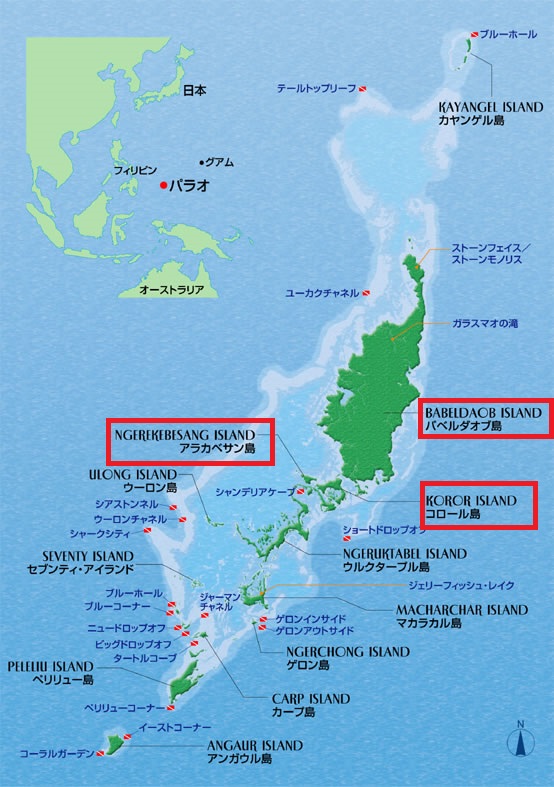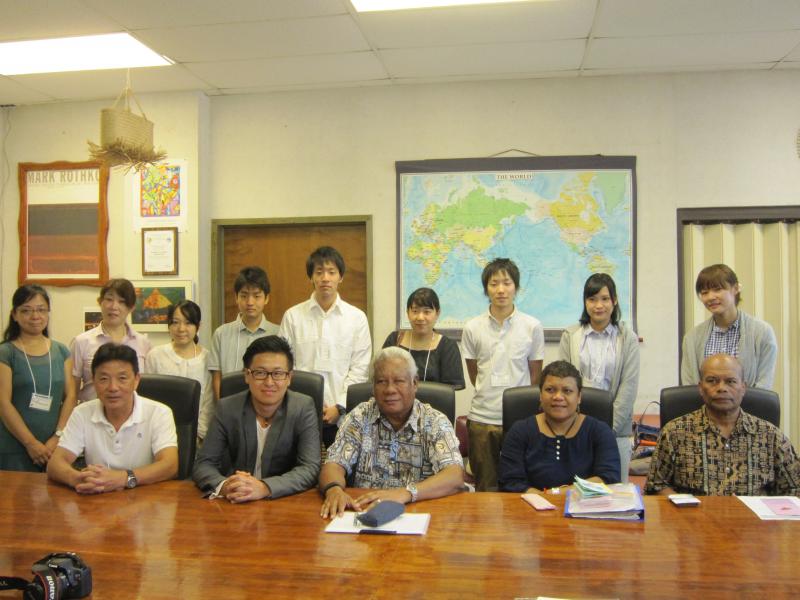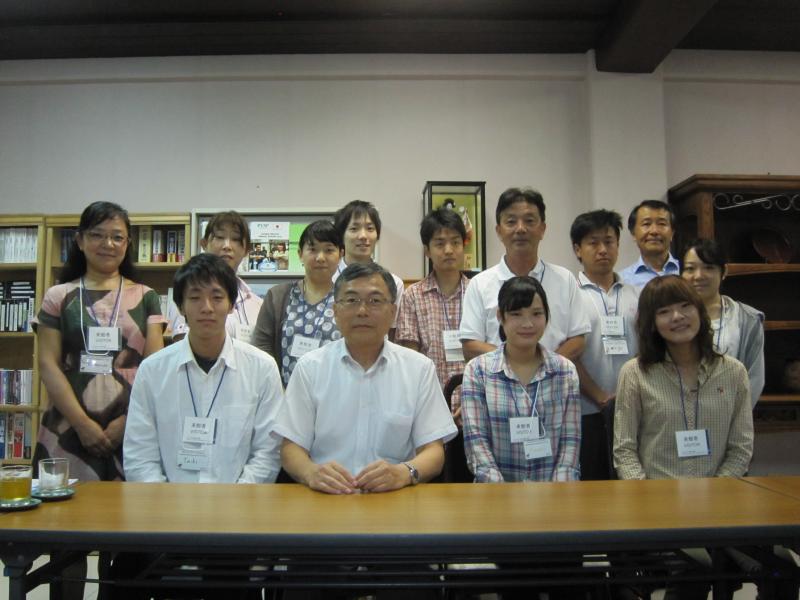Home > Workshop and Training > OVERSEAS > Fiscal Year 2016 > FY2015 ERCA Training Program Held in Palau
Main content starts here.
Update:July 29, 2016
FY2015 ERCA Training Program Held in Palau
The Republic of Palau has a population of about 20,000. The Micronesian country also has an area of 488 square kilometers, nearly as large as Yakushima, a Japanese island. The country attracts large numbers of tourists with its beautiful seas. Among the many islands of various sizes in Palau, a Japanese group visited mainly three islands marked in red squares where they carried out training activities: Koror, Ngerekebesang, and Babeldaob.

Objectives:
This program was commissioned by the Japan Fund for Global Environment under the Environmental Restoration and Conservation Agency of Japan. It was intended for staff members of Japanese NGOs and NPOs engaged in environmental activities, those who have attended environmental activities overseas before, or those who are interested in environmental protection activities by NGOs and NPOs in developing regions. It also aimed at cultivating experts in international environmental cooperation while providing opportunities for Japanese participants to acquire useful knowledge, knowhow, and skills to conduct activities in developing countries.
Outline:
Ten Japanese, six of them university students, participated. On August 29 (Sat.) and 30 (Sun.), 2015, the participants selected from all over Japan met in Tokyo for advance preparation. They stayed together overnight to plan the subjects of their individual activities and their work within the three teams they formed for their field work in Palau. They also listened to lecturers, who is familiar with the island country, to learn about the situation there
Team names and themes:
“L.E.E.” – Education on the Environment
“Vamos!” – Sustainable Ecotourism
“MOTTAINAI” – Shaping of Recycling-Oriented Societies

Training Program in Palau
Long-term course: September 26 (Sat.) to October 11 (Sun.), 2015
Short-term course: September 26 (Sat.) to October 4 (Sun.), 2015
The day after the group of Japanese participants arrived in Palau, there was a kick-off meeting. There, they formed a simulated NPO to conduct activities in this program.
Name of the simulated NPO: “Palau Japan ESD Project”
Aim: “Pursuing Both Environmental Protection and Economic Growth”
Activities: “Education on the Environment”
Ahead of their activities, the Japanese group visited cabinet members of Palau to learn about the details of the country.
At the Ministry of Education, they met Minister of State Billy Kuartei, Minister of Community & Cultural Affairs Baklai Temengil-Chilton, and Minister of Public Infrastructure, Industries and Commerce Charles Obichang. According to these ministers, Palau, which relies heavily on environmental industry, is now confronted with a serious shortage of hotel rooms and freshwater because of a recent explosive increase in the number of tourists. The country has another problem with its poor Internet environment. To cope with these issues, ideas are taken into consideration to introduce a system of renting private homes and rooms and improve the Internet environment by laying undersea cables and taking other measures. The ministers showed eagerness to host international conventions in Palau at some future time.


They also visited the Palau International Coral Reef Center. Mr. Yimnang Golbuu, Chief Executive Officer of this NPO, explained to the participants the problems of managing the organization, efforts to solve them, and joint research projects with a Japanese university. When the Japanese toured an aquarium, adjacent to the center, they heard that the center was built close to research locations and offers researchers in the field of marine ecosystems easy access by boat, resulting in a good environment to work on their research projects.


During their stay in Palau, the Japanese group also visited Koror Elementary School and Palau High School to conduct activities as a simulated NGO and NPO. After school and with cooperation by teachers and students from the two schools, they examined and modified various ideas they had previously developed in Japan, to see if those ideas would work well in Palau. There was an opportunity for the Japanese to deepen their friendships with the local people while discussing these ideas.


At Koror Elementary School, Team “L.E.E.” provided education on the environment through scientific experiences. The team members first used a simple appliance available in Palau to change shredded plastic bottles into fibers. Students gave a shout of joy to see how the thin pellets inside a heated metal can came out as a thin thread from the hole at the bottom. Many of the students left positive comments, saying in surprise that the scientific experiment gave them an opportunity to realize how important it is to recover plastic bottles. In this country, plastic bottles are collected as resources at Koror State’s waste recycling center.


On October 1, Palau’s Independence Day, the Japanese participants attended an event to celebrate the special day in Melekeok, the country’s new capital. They sought to deepen their exchanges with local Palauan people by interviewing them. The participants also came in touch with Palauan culture by watching dancers and singers perform on stage while trying local Palauan food, which was sold at booths operated by each of the states. Focusing on promotion of “personal-use thermos bottles”, not plastic bottles, Team “MOTTAINAI” enjoyed interviewing local visitors and teaching how to knit “eco scrubbing brushes” using acrylic yarn to wash the personal-use bottles. The knitting attracted so many people that the Japanese ran out of yarn they had brought from Japan.
At sunset, an official ceremony to celebrate the Independence Day took place. There, Palau President Tommy Remengesau gave a speech, which was followed by congratulatory addresses delivered by representatives from other countries. At the end of the ceremony, there was a show of fireworks brought in from Japan and Taiwan as proof of their friendships with Palau. The Japanese participants had an opportunity to splendidly celebrate the special day with local Palauan people.


The participants visited Babeldaob, the largest island in Palau’s archipelago, where traditional Palauan culture has largely survived. They visited local elementary schools, and then went to the homes of the school principals for a day as a home visit experience. The Japanese were taken to places of natural beauty and historical interest on the island and saw Palau’s unique culture. Some of the participants left for the day trip with anxious looks on their faces but returned from the visits with many comments saying that it was quite a good experience to go to those places.
During their stay in Palau, the participants twice put together proposals by taking advantage of what they had learned through many visits and field work. Team “Vamos!” on Sustainable Ecotourism offered proposals for the development of local attractions on the islands and their promotion among foreign tourists.

Debriefing Session
After returning home, the participants met the day before the December 10 (Thur.) 2015 activity debriefing session to prepare for the occasion. A1-size posters were used to present team activities in Palau while each of the participants used a sheet of A4-size paper to explain the survey results of the individual theme. They were all posted in shared space at the venue.
Team “L.E.E.” made a presentation about their field work and proposals while explaining activities and objectives of the simulated NPO called “Palau Japan ESD Project”. Teams each explained their activities and what they had learned and noticed during their stay in Palau.
There was a lively discussion because many questions were asked by attendees at the session.
The participants expressed their impressions through this program as follows:
- There was a lot they wouldn’t have learned and found out if they hadn’t visited Palau.
- They felt it was necessary to recognize the viewpoints of those who need assistance.
- They realized how difficult it was to set up and prove hypotheses.
- It was a significant experience to figure out how to explain theoretical plans formulated in Japan to local people so that they could work together on realizing them.



ICETT would like to express its gratitude to the Palauan government, the Embassy of Japan in Palau, and many other organizations which provided cordial cooperation and support for this training program.







